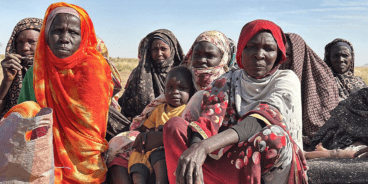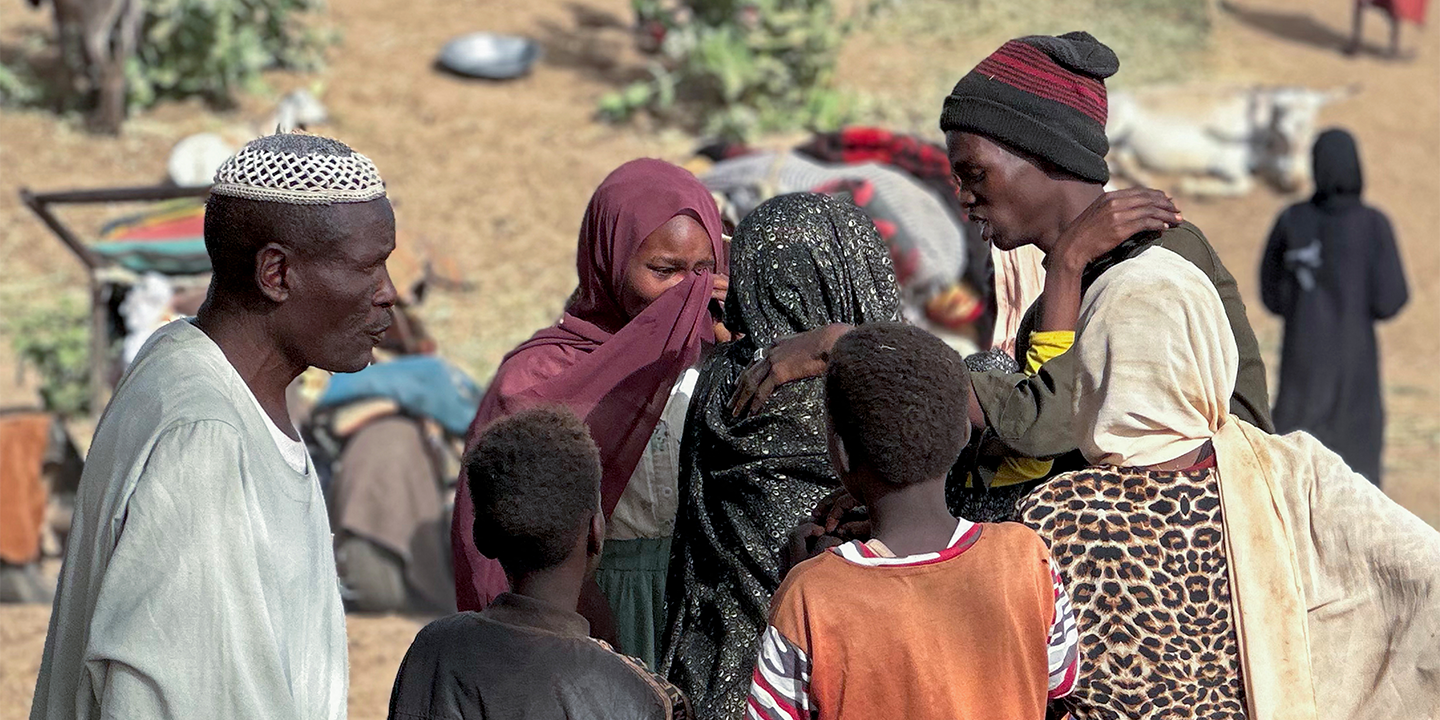

Atrocity Alert No. 435: Sudan, Israel and the Occupied Palestinian Territory and Democratic Republic of the Congo
Atrocity Alert is a weekly publication by the Global Centre for the Responsibility to Protect highlighting situations where populations are at risk of, or are enduring, mass atrocity crimes.
HUNDREDS OF CIVILIANS KILLED DURING COORDINATED ATTACKS IN DARFUR
Beginning on Thursday, 10 April, Sudan’s paramilitary Rapid Support Forces (RSF) launched a series of coordinated, multi-day attacks on North Darfur. Heavy shelling and ground assaults targeted the Zamzam and Abu Shouk displacement camps and the capital, El Fasher, causing widespread destruction of homes, markets and medical facilities. By 12 April RSF fighters had advanced from Nyala, Shegara and surrounding areas to completely encircle both El Fasher and Zamzam camp, effectively cutting off all escape routes and blocking humanitarian access. The RSF claimed control of Zamzam camp the following day. According to the UN, more than 400 civilians have been killed during the attacks, including 20 children and 12 aid workers. However, reports from the ground indicate that the figure may be significantly higher.
These events followed months of urgent warnings from human rights organizations and others about the imminent threat of RSF attacks. RSF forces have expanded their control over nearly all of Darfur – with dozens of cities, towns and villages fully or partially destroyed – while El Fasher remains the last major holdout, where fighting is currently ongoing. Repeated alerts highlighted the growing RSF presence around El Fasher and warned of escalating risks of ethnically motivated violence and potential genocide targeting displaced communities. In February the RSF launched their first targeted ground attack on Zamzam camp, setting fire to the camp’s main eastern market and several homes, while also looting and destroying vehicles and property. Zamzam and Abu Shouk are among the largest displacement camps in Darfur, providing refuge to more than 700,000 people, many of whom have fled waves of violence over the past two decades and have nowhere safe to go.
In response to the RSF’s attacks on El Fasher, Juliette Paauwe, Sudan expert at the Global Centre for the Responsibility to Protect, said, “The international community’s lack of effective action, amid clear early warning signs, underscores a stark failure to uphold the responsibility to protect vulnerable civilians, allowing yet another atrocity to unfold unchecked and unpunished.”
Yesterday, 15 April, marked the second anniversary of the outbreak of the conflict in Sudan. Over the past two years, the violence has claimed tens of thousands of lives, displaced millions and devastated livelihoods across the country. On 14 April the UN Human Rights Council-mandated Fact-Finding Mission on Sudan warned, “Amid the rising tide of hate speech and ethnically driven violence and reprisals, we fear the darkest chapters of this conflict have yet to unfold.”
Strong measures are needed to urgently protect civilians and prevent further atrocities in North Darfur and across Sudan. Despite last weekend’s devastating attacks, the co-chairs statement following yesterday’s ministerial meeting in London made no reference to the situation in Darfur. This failure to acknowledge ongoing atrocities is unacceptable. The international community must take immediate and coordinated action to demand the RSF halt the ongoing violence in El Fasher. The RSF and allied militias must immediately cease all acts of violence, adhere to international law and ensure the unrestricted flow of life-saving aid.
PALESTINIANS IN GAZA ENDURE ISRAELI-MADE HUMANITARIAN CATASTROPHE AMID ATROCITIES
Since the resumption of hostilities in Gaza on 18 March, Israeli forces have killed over 1,500 Palestinians, bringing the total death toll since October 2023 to nearly 51,000 people, according to the Ministry of Health in Gaza. The humanitarian situation continues to deteriorate rapidly amidst a total siege, with no food, fuel, medicine, clean water or other essential supplies entering the enclave since 2 March. This has forced some aid organizations to reduce their food distribution to just one meal a day. Nearly 400,000 residents of Gaza have been forcibly displaced, according to the UN Relief and Works Agency for Palestine Refugees.
On 11 April the Office of the UN High Commissioner for Human Rights (OHCHR) issued a stark warning about the collective impact of Israel’s siege, continued displacement orders and ongoing military operations, stating that, “Israel appears to be inflicting on Palestinians in Gaza conditions of life incompatible with their continued existence as a group.”
Israel’s creation of so-called “buffer zones” and the issuance of over 20 displacement orders have effectively rendered approximately 70 percent of Gaza inaccessible to Palestinians. OHCHR has condemned Israel’s abuse and misuse of temporary evacuation orders under International Humanitarian Law (IHL), stating that, “the nature and scope of evacuation orders raise serious concerns that Israel intends permanently to remove the civilian population from these areas in order the create a ‘buffer-zone’,” in what amounts to forcible transfer, a grave violation of IHL and a crime against humanity.
In addition to blocking the entry of all new humanitarian aid, Israeli authorities have also obstructed the delivery of the limited resources that remains inside Gaza. Between 3-7 April Israeli authorities denied 25 of 36 coordinated aid movements. Humanitarians have routinely been denied access to roughly two-thirds of Gaza, severely hampering relief efforts. In response, the heads of six UN aid agencies issued a rare joint appeal on 7 April, urging world leaders to take immediate action to uphold international law and protect Palestinians in Gaza. The following day, UN Secretary-General António Guterres echoed that plea, calling on Israel to abide by its obligations as an Occupying Power and allow for unimpeded humanitarian access. Secretary-General Guterres also emphasized that the UN will not participate in any aid delivery mechanisms proposed or dictated solely by Israel, reaffirming the commitment to humanitarian principles.
States with influence must act urgently and decisively to help reinstate a ceasefire and pressure Israel to lift the siege on Gaza. All states must confront the long-standing impunity afforded to Israel by leveraging all political, economic and legal measures available to hold Israeli officials accountable for atrocity crimes and defend the rights of the Palestinian people.
RATES OF SEXUAL VIOLENCE AGAINST CHILDREN ARE RISING IN EASTERN DRC
On 11 April the UN Children’s Fund (UNICEF) Spokesperson, James Elder, reported that rates of sexual violence in the Democratic Republic of the Congo (DRC) have reached unprecedented levels amid ongoing clashes and armed group activity in the eastern provinces. Children account for an estimated 35 to 45 percent of the nearly 10,000 cases of rape and sexual violence reported in January and February alone. According to UNICEF, a child is raped or sexually assaulted every half hour. The true extent of the crisis is likely far worse due to significant underreporting. Elder stated, “We are not talking about isolated incidents; we are talking about a systemic crisis. We are seeing survivors as young as toddlers. It is a weapon of war and a deliberate tactic of terror.”
In recent months, the escalating fighting between the Congolese armed forces and the Rwandan-backed March 23 Movement (M23) armed group has resulted in widespread civilian suffering. Since M23’s rapid territorial advances in North and South Kivu, over 7,000 people have been killed and more than 1 million displaced, many multiple times. Conflict-related sexual violence has surged, with a 270 percent spike in reported cases from January to February. The UN has also documented 602 extrajudicial or summary executions in North and South Kivu since the beginning of the year.
On 9 April delegations from the DRC government and M23 met in Doha, Qatar, in a long-anticipated round of negotiations. The talks followed a Qatar-brokered meeting between DRC President Félix Tshisekedi and Rwandan President Paul Kagame, signaling possible diplomatic progress.
Competition for control of profitable minerals has contributed to a thriving conflict-economy that fuels recurrent violence and abuses against civilians. UN Deputy High Commissioner for Human Rights Nada Al-Nashif emphasized, “Any plans for a sustainable peace must tackle the root causes of the conflict, including the illegal exploitation of the national wealth that lies in natural resources.” According to the latest report by the UN Group of Experts on the DRC, M23 and the allied Alliance Fleuve Congo (AFC) controlled the routes from the Congolese mining town of Rubaya to Rwanda, where minerals are allegedly mixed with Rwandan production. The UN experts concluded that “fraudulent extraction, trade and export to Rwanda of Rubaya minerals thus benefited both AFC/M23 and the Rwandan economy.”
The international community must take coordinated action to pressure all parties to pursue a durable peace. This includes enforcing stronger due diligence laws for mineral supply chains, sanctioning actors that profit from conflict resources and increasing diplomatic pressure on those supporting armed groups. The international community must also urgently scale up funding for critical services for survivors, including medical care, psychological support and legal assistance – resources which remain severely underfunded.
Related Content


Expert Voices on Atrocity Prevention Episode 43: Adama Dieng
